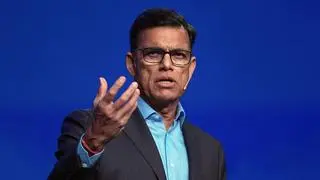The highly diversified Hinduja group, which has presence in at least 11 sectors, is drawing up ambitious plans for its play in the BFSI segment.
“The plan for BFSI is all clear — we are targeting to touch anywhere between $35-40 billion value creation on that,” declares Ashok Hinduja, Chairman of IndusInd International Holdings Ltd, at a select media briefing in London recently. Asked when this will happen, he responds, “We are targeting a minimum of five years or so — by 2030. You see every entity has its own board. So, all need to be on the same page for a macro strategy.”
The group had been active in the segment under IndusInd Bank and Hinduja Leyland Finance. In 2019, it stepped up its presence in the category by acquiring Bharat Financial, India’s largest microfinance institution with 3,492 branches. Earlier this year, the group put in a bid of ₹9,661 crore to acquire the distressed Reliance Capital. This was approved by RCap’s lenders this August giving the group a foothold in life insurance, general insurance and health insurance, among others.
Raising the stakes
The family has a story to tell about IndusInd Bank, which will turn 30 in a year’s time. Established in 1994 by a platform conceived and promoted by the Hinduja family, along with members of the Indian diaspora, the name ‘IndusInd Bank’ was inspired by the Indus Valley Civilisation — a hark back to the great culture and trade practices of yore. As of September 30, 2023, IndusInd Bank has 6,657 outlets including 2,631 branches and 2,903 ATMs spread across 28 States and 9 UTs. The bank also has representative offices in London, Dubai and Abu Dhabi.
The promoting entity, Mauritius-registered IndusInd International Holdings Ltd, is in the process of raising its stake in IndusInd Bank, as it believes a strong promoter presence is necessary. Ashok Hinduja says, “I have been telling the government, including the Reserve Bank, that you should have a policy of the strong promoter group. If you see the original licence (of 1994), the permissible promoter holding was minimum 40 per cent. In years to come, they went on diluting and it came down to 10 per cent. Then after a lot of debates and discussions they stopped at 15 per cent. And, subsequently, they have modified the policy to allow promoter stake at 26 per cent. Now after this change (26 per cent), we approached the regulators and they have given us consent that yes, as per the policy we can increase the stake.”
So when will the buyback happen? “With consent in hand, we have started the process of raising the capital. We will get over a billion dollars to go into phases, our first capital raise, which was the treasury shares, was there. So, we’ll be completing that hopefully by November 15,” explains Hinduja.
Full stack coverage
He stresses how the objective is to grow the BFSI sector to complete the full stack, including mutual funds. “Hopefully, by this financial year, we will cover 95 per cent of the BFSI sector,” he said.
As regards to mutual funds, will the group look at an acquisition? “The market is big. Everybody has an opportunity to come in, everybody will have their own pie, because it’s a big market and there are some opportunities which are already available,” responds Hinduja.
In the next phase, focus will also be on refreshing the technology and honing the digital and fintech aspects, he stresses. “In the BFSI segment, I think there’s a big thrust to make sure that we move more and more from a technology perspective using AI in many respects and for improving the business efficiencies as well,” he adds.
On Reliance Capital, he said he expects a decision by November. Currently the matter is sub judice. “Reliance Capital, once if we get it, it will remain a separate entity with a common parent,” he says.
In the Hinduja group, each entity operates independently as a conscious strategy. “You have general insurance which is run separately, you have life insurance where 49 per cent is already with Nippon, but health and general will be 100 per cent ours. So, these are value creations, which after two, three years can go for the IPOs,” he explains.
Future play
Will the Hinduja group pitch for IDBI? “But what value can it give? he asks, adding, “Today you don’t need branches, because everything is now becoming digital. Nobody wants to go to a branch, right? So the branches are not required. Today there are so many banks — smaller, mid-sized banks, which are available and I think the regulator is telling various banks why don’t they consolidate?”
Is the group keen on buying brokerage firm Sharekhan? To this, Hinduja says, “One has to look into everything, but in the BFSI sector, whatever will be missing will be added post opportunity evaluation at an appropriate time.”
While the details are still nebulous, one thing emerges clearly though — the group is aggressively strengthening its position in BFSI.
(The writer was in London at the invitation of the Hinduja group)







Comments
Comments have to be in English, and in full sentences. They cannot be abusive or personal. Please abide by our community guidelines for posting your comments.
We have migrated to a new commenting platform. If you are already a registered user of TheHindu Businessline and logged in, you may continue to engage with our articles. If you do not have an account please register and login to post comments. Users can access their older comments by logging into their accounts on Vuukle.